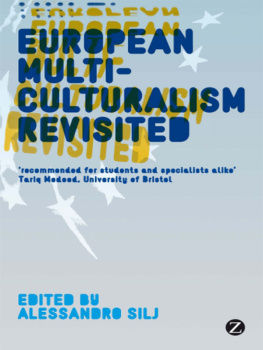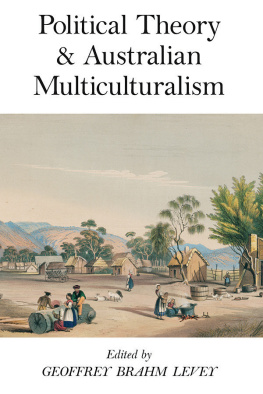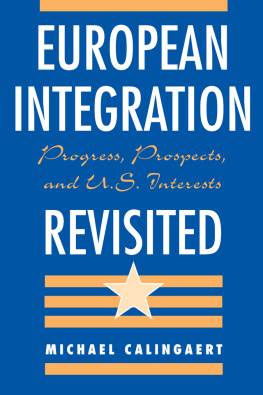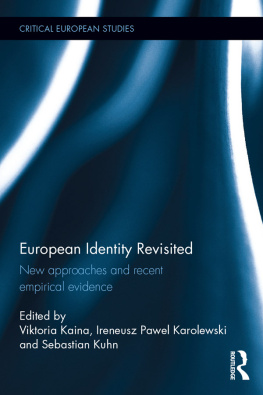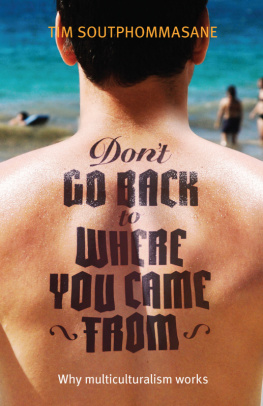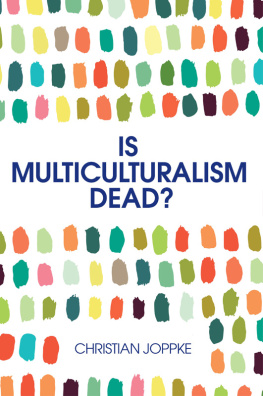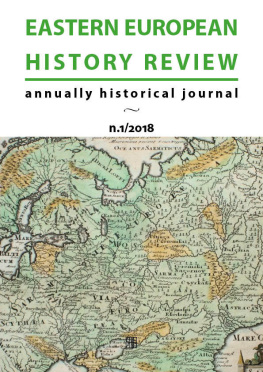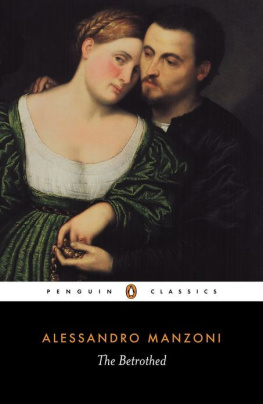European Multiculturalism Revisited was first published in 2010 by Zed Books Ltd, 7 Cynthia Street, London N1 9JF, UK and Room 400, 175 Fifth Avenue, New York, NY 10010, USA
This ebook edition was first published in 2013
www.zedbooks.co.uk
Editorial copyright Ethnobarometer 2010
Copyright in this collection Zed Books 2010
The right of Alessandro Silj to be identified as the editor of this work has been asserted by him in accordance with the Copyright, Designs and Patents Act, 1988
Designed and typeset Monotype Ehrhardt by illuminati, Grosmont
Index by John Barker
Cover designed by Transmission
All rights reserved. No part of this publication may be reproduced, stored in a retrieval system or transmitted in any form or by any means, electronic, mechanical, photocopying or otherwise, without the prior permission of Zed Books Ltd.
A catalogue record for this book is available from the British Library
Library of Congress Cataloging in Publication Data available
ISBN: 978 1 84813 873 5
Acknowledgements
I wish to thank the Compagnia di San Paolo, our main sponsor when we started working on multiculturalism in Europe, and the Freudenberg Stiftung, who hosted the first meeting of the research team in Weinheim. Above all, I am grateful to all the members of the team who co-authored this book, which is not simply a reader. The project was discussed with the authors before Ethnobarometer decided to proceed with it, the methodology and preliminary papers were discussed in Weinheim, we met again in Turin after the first drafts were completed, and subsequently all chapters were revised to update them. I wish to thank Tariq Modood and Anne Phillips who participated as discussants in the Turin meeting, contributing ideas and suggestions, and to Christophe Bertossi, who wrote the Conclusion. Finally, thanks also to Jonathan Chaloff, whose knowledge and experience on migration and integration issues was a most valuable resource when editing this book.
Introduction
Alessandro Silj
Ethnobarometers research on multiculturalism in Europe, whose findings are presented in this volume, began in 2007, following fieldwork on European Muslim communities after 9/11. Popular opposition to immigration had been growing for some time and integration processes, which in the past had not been nearly as successful as liberal public opinion had hoped, were in serious trouble. The very meaning of the term integration was being questioned by a growing number of people, and what some called multiculturalism and others different names was becoming a negative value rather than one of the founding principles of Western democracies. This trend was not new but was beginning to have an impact on both local and national policies and practice.
Multiculturalism has been, from the very early days, a very ambiguous and therefore inevitably controversial concept. Originally the term multiculturalism was put forward by those who were (politically and ideologically) against the concept and policies of assimilation that is, the French approach to integration. Integration, on the other hand, is a rather loose concept that stands in between the other two and is common to both. In its more general meaning it assumes that the immigrant fully participates in the socio-economic life of the host country, and the term is being used without specific reference to the institutional and cultural parameters that shape such participation. It can mean different things depending on the context. We have assimilation when the immigrant renounces his or her claim to a distinct national, ethnic, cultural or religious identity and blends into the identity of the host country. We have multiculturalism when diversity is recognized and perceived as being positive and desirable, and the Other is not perceived as a threat to the identity, values and culture of the host society.
The ambiguity of the concept of multiculturalism is clear from the many alternative words with which it has been called by scholars and politicians. In addition to integration, assimilation and multiculturalism, some have used incorporation, and others pluralism and even plural monoculturalism (Amartya Sen), or pluriculturalism, interculturalism, communitarianism (co-existence of communities within the same political space), and still others such apparently intricate concepts as disintegrated multiculturalism and integrated multiculturalism (Michel Vieworka, in discussing the USA, on one hand and the cases of Canada, Australia and Sweden, on the other). Some have spoken of assimilation without participation (related to Switzerland). Finally, multiculturalism has been described as a fraudulent alternative to equal opportunity (John Rex).
However, our aim is not to engage in the theoretical and terminological debate on this issue. We have opted for an empirical approach, using case studies to review and analyse the main models of multicultural societies that Europe has experienced from the end of World War II until the present day. Multiculturalism has never been immune to criticism or opposition, but it hit the media headlines and climbed the agendas of governments (indeed, in some countries, became an electoral issue) after 9/11 and the bombings in Madrid and London, in the Netherlands after the assassination of Van Gogh, and in Denmark following the Jyllands-Posten cartoon affair. These events influenced public opinion in most European countries, including France, where in the meantime doubts about the countrys assimilation approach had grown stronger, and where riots in the banlieues signalled serious social problems.
Our research, conducted by local scholars, covered six countries: Great Britain, the Netherlands, France, Germany, Denmark and Italy (the Italian model being the lack of a model). Each case study consisted of a historical account of how in that country the model developed (underlying principles, policies) and was implemented in practice, followed by an analysis of the factors that have led to the claim that the model has failed. The question asked was, did the model actually fail, and if it failed was this because of intrinsic weaknesses, or rather because of external and contingent circumstances, and if so does this justify the claim that is, are the British and other models really bad? The research team met in Germany in December 2006 to discuss the first outline and methodology of the country reports, then again in Italy in 2007 to discuss preliminary drafts. Some of the reports were updated in 2008.
European responses to multiculturalism
The most important and controversial issues that multiculturalism has raised in European societies are cultural rights, legal pluralism and integration in state schools, among others. However none of these issues alone could have caused such wide and dramatic waves of public concern about the future of our societies. In each country, the research analysed the factors that might offer clues to aid our understanding of the roots and nature of that concern.
Thus Maleiha Malik, after observing that there has always been cultural, linguistic, ethnic and religious diversity in Britain, remarks that post-war immigration has resulted in new challenges to the accommodation of minorities on the basis of their racial, cultural and religious differences. The British response to this migration has taken the form of policies of tolerance and non-discrimination, supplemented by strategies of multicultural accommodation, especially in areas such as education. The two factors to be considered, Malik writes, are the increasing importance of global context and the shift by minorities towards a more confident politics of recognition. Official accommodation of this diversity within the definition of the nation has depended on different forces: the social and political power of the group that is seeking accommodation; the relationship between the domestic and the international context; and access to socio-economic wealth.


